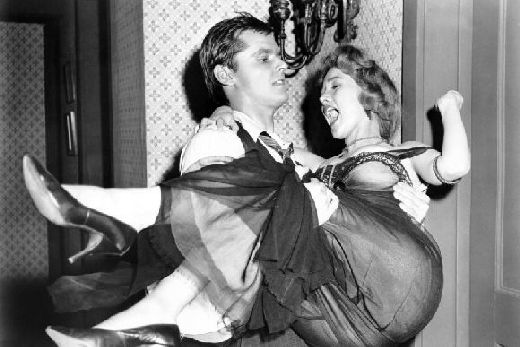Studs Lonigan (1960) 

Director: Irving Lerner
Cast: Christopher Knight, Frank Gorshin, Venetia Stevenson
Synopsis: A young man tries to escape the South Side of 1920s Chicago.
I remember reading James T. Farrell’s labyrinthine account of youthful futility in the late 1970s or early 1980s when the trilogy was published as one house brick-sized tome as a tie-in to the TV mini-series starring Harry Hamlin. Funnily enough, ITV suffered a month-long strike by its workers that began during an ad break in the middle of the programme’s first episode and I never did get to see the full mini-series — all I can remember about it now is Studs (Harry Hamlin) describing a baby as being ‘perfectly bald.’
Anyway, I wasn’t expecting great things from this low-budget 60s version but it’s plain to see that a lot of thought and effort went into condensing Farrell’s books into a 95-minute film. While that doesn’t necessarily make this a great film (or anything near) it does give it an edge over much of the similar, higher budget fare coming out of Hollywood at the time, and it can almost be described as being ahead of its time in the stark manner in which it portrays the wasted, near-dissolute life of a 1920s Chicago youth desperate — but incapable of — improving his lot.
Newcomer Christopher Knight plays the title character. Given the fact that much of the time he has to provide facial expressions and reactions to the internal dialogue we hear as a voice-over, he does pretty well for a debutant in a role that would have stretched more experienced actors. Apart from a small role in a Sandra Dee comedy, Knight seems to have disappeared from the screen entirely, which is surprising given his ability and looks. He’s supported here by Jack Nicholson (About Schmidt, The Departed) and Frank Gorshin (Warlock), two performers who went on to better things, but is in no way overshadowed by them. In fact Nicholson is pretty bland here, although he admittedly has little to work with.
Of course, many of the incidents from the book are missing entirely and, in trying to fit in as much source material as he can, Philip Yordan has created a somewhat episodic saga. Sometimes a throwaway line reveals that a couple of years has passed since the previous dramatic episode and, instead of conveying a sense of the boring routine of the character’s lives it simply leaves the viewer wondering what has happened to them in between. Everybody’s life, no matter how routine and dreary it may be, changes to some degree.
What does come through, though, is Lonigan’s sense of frustrated ambition, of life controlling him instead of the other way around. In the book, Lonigan dies, his health and spirit broken by the dissolute lifestyle he finally embraced as a result of the frustration of his ambitions, but here, although the film is open-ended (and quite bravely so for the time) there is some kind of hope, or at least the indication that his and Kathleen’s story isn’t over yet.
If you’re familiar with Farrell’s books ignore the generally mediocre reviews this movie has received and give the film a chance. Even though it might not succeed in its aims it is always interesting to watch.
(Reviewed 18th September 2008)
httpv://www.youtube.com/watch?v=eCL4TnY8Ejc
